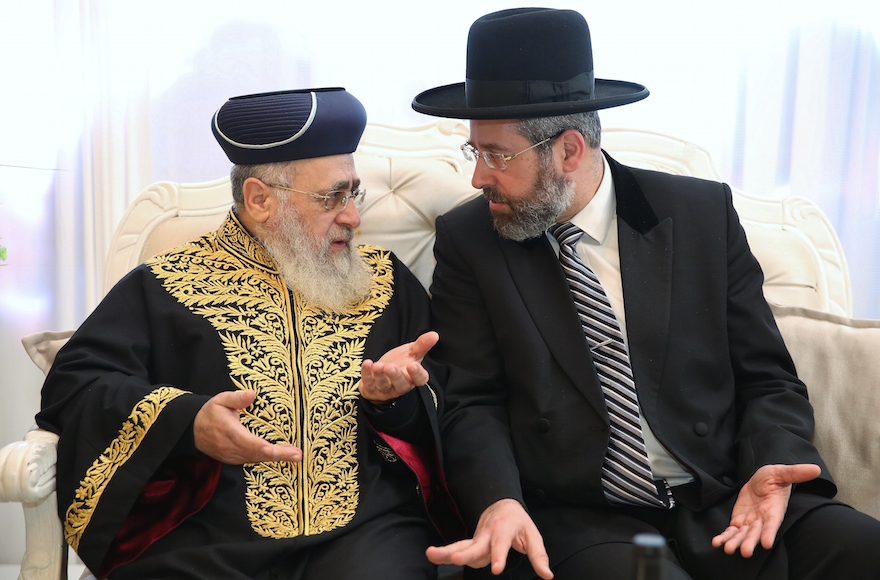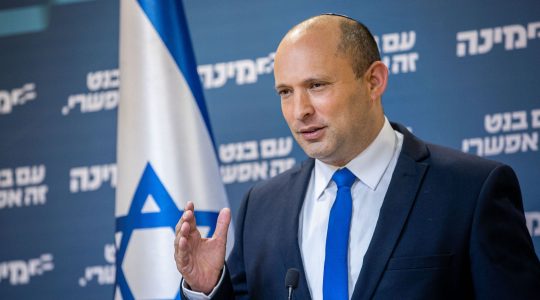JERUSALEM (JTA) — Israel’s Chief Rabbinate formed a panel to set standards for which Diaspora rabbis’ conversions it would accept as valid.
The Ashkenazi and Sephardi chief rabbis issued a joint statement Wednesday afternoon saying they had formed the five-member committee following a meeting earlier in the day of members of the Rabbinate Council and the Supreme Rabbinical Court.
In announcing Wednesday’s meeting last week, Sephardi Chief Rabbi Yitzhak Yosef said a list of recognized rabbis would be created based on the standards that were determined. The Rabbinate would automatically recognize conversions — as well as marriages and divorces — by the listed rabbis. Israel’s rabbinical courts have in the past handled disputes over the legitimacy of conversions performed abroad.
Orthodox rabbis in North America, especially representing modern Orthodoxy, have complained over the past few years that the haredi-controlled Chief Rabbinate was rejecting the conversions performed by modern Orthodox rabbis.
Yosef also promised the Jewish conversion of Ivanka Trump, the daughter of U.S. President-elect Donald Trump, would be recognized under the new standards. But the new committee includes a rabbi who sat on the panel of judges that recently rejected a conversion overseen by Haskel Lookstein of New York, the rabbi who helped Ivanka Trump convert.
The Chief Rabbinate is Israel’s highest Jewish authority, with control over personal status issues such as conversion, marriage and divorce. The Chief Rabbinate Council is its advisory body. The Supreme Rabbinical Court is the highest rabbinical court, which resolves disputes regarding personal status issues.
During Wednesday’s meeting, Lau issued his own statement saying the discussion at the meeting was based on principles he had submitted at a September meeting of the Chief Rabbinate.
According to those principles, rabbis must believe in Jewish law, be Orthodox, serve in places with rabbinical courts that are recognized by local rabbis, be accepted by their community and be members of existing rabbinical organizations. Alternatively, they can be vetted by the chief rabbis in consultation with “the heads of the rabbis of the community.”
The members of the committee to develop the standards were announced as High Rabbinical Court judges Rabbi Aaron Katz, Rabbi Shlomo Shapira, and Rabbi Yitzhak Elmaliah, and Chief Rabbinical Council members Rabbi Yitzhak Ralbag and Rabbi Yehuda Deri.

Ivanka Trump and Jared Kushner listening as Donald Trump speaks during election night at the New York Hilton Midtown in Manhattan, Nov. 9, 2016. (Mandel Ngan/AFP/Getty Images)
Elmaliah was among the Supreme Rabbinical Court judges who in July controversially rejected a conversion by Lookstein, the former leader at Kehilath Jeshurun on Manhattan’s Upper East Side. Lookstein oversaw Ivanka Trump’s conversion to Judaism before her marriage to Jared Kushner.
Ralbag is Lau’s father-in-law, and Deri is the older brother of Aryeh Deri, the head of the Shas political party.
Rabbi Seth Farber, the director of Itim, an organization that helps Israelis navigate the state’s religious bureaucracy, in a statement Wednesday expressed concern about the committee members, including Elmaliah, and about Lau’s statement of principles.
According to Farber, Orthodox conversions that were performed by rabbis such as Lookstein would not appear to be recognized automatically.
“The chief rabbis had stated they were planning to ease the plight of converts, but the direction they are taking may in fact worsen it,” Farber said.
He called on the Rabbinate to enter into dialogue with Diaspora Jewish communities with the aim of “building trust,” not “disenfranchising” them. Farber also urged the Rabbinate to recognize the challenges facing local rabbis in combating intermarriage and assimilation.
The Chief Rabbinate has never recognized non-Orthodox rabbis or conversions, and Lookstein is among several leading modern Orthodox rabbis whose credentials it has questioned in the past few years. In September, Haaretz revealed that the Rabbinate had rejected four conversions approved by Rabbi Gedalia Dov Schwartz, the head of the Rabbinical Council of America’s rabbinical court, the Beth Din of America. Lau, in his principles, singled out the Beit Bin of America as a reliable organization.
Itim petitioned a Jerusalem court in 2015 to pressure the Rabbinate to be more transparent about how it determines which Jewish conversions are legitimate. In April, the Rabbinate released a list of more than 100 rabbis from the U.S. and 19 other countries whose authority over Jewish conversions it accepts.
But the Rabbinate attached a letter to the list saying it was “not exhaustive” and simply included rabbis whose authority had been accepted in the past. The letter also said there was no guarantee the rabbis would be trusted in the future.
The statement issued after Wednesday’s meeting also said Lau would create a database of marriages performed by recognized rabbis abroad, so “when the married couple will arrive in Israel it will be possible to verify immediately and to approve the marriage.” To have a Jewish marriage in Israel, immigrants must prove to the Rabbinate that they meet its standards of Jewishness.
JTA has documented Jewish history in real-time for over a century. Keep our journalism strong by joining us in supporting independent, award-winning reporting.






